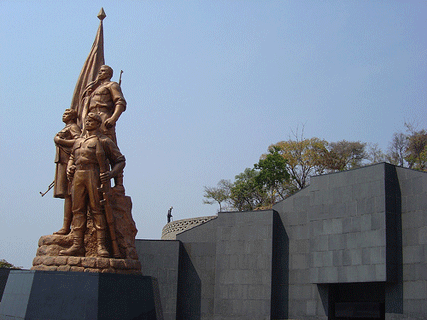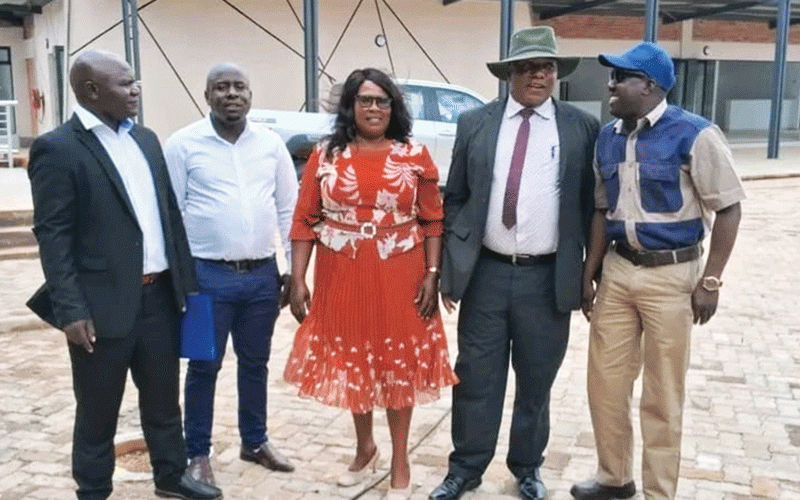
ZIMBABWE today celebrates thousands of gallant fighters who fought bravely to defeat the colonial regime of Ian Smith, culminating in independence in 1980.
The government honours the heroes by burying them at heroes’ acres classified as district, provincial and national shrines.
However, there seems to be no consensus on what constitutes a hero with President Robert Mugabe frequently telling those against Zanu PF’s criteria to set up their own heroes’ acre. This has seen a growing number of tainted politicians being declared the country’s heroes.
Below is a list of 10 such heroes.
Border Gezi Gezi, who died on April 28 2001 in a mysterious road accident, served as Gender, Youth and Employment minister from 2000. He had also worked as provincial governor for Mashonaland Central.
Gezi was in charge of the national youth service whose recruits were turned into a Zanu PF militia that was implicated in the deadly political violence against MDC supporters.
The youths that became known as the Green Bombers, because of their green military fatigues, were also at the forefront of the land invasions.
He was declared a national hero despite a chorus of disapproval from Zanu PF opponents. Elliot Manyika Manyika succeeded Gezi as Gender, Youth and Employment minister before he was made Minister Without Portfolio. He died in a road accident on December 6 2008 and was subsequently declared a national hero. Manyika turned the Border Gezi youths into a mean machine.
- Chamisa under fire over US$120K donation
- Mavhunga puts DeMbare into Chibuku quarterfinals
- Pension funds bet on Cabora Bassa oilfields
- Councils defy govt fire tender directive
Keep Reading
He was implicated in political violence cases on several occasions and the MDC protested his burial at the National Heroes’ Acre. Chenjerai Hunzvi
The Poland-trained medical doctor became synonymous with Zimbabwe’s descent into lawlessness.
He rose to prominence in 1997 when he led war veterans’ protests that targeted Mugabe, which saw the veteran ruler buckling under pressure to award the former fighters lump sum pensions of Z$50 000 each.
The unbudgeted pensions proved to be the genesis of Zimbabwe’s economic problems that culminated in the country abandoning its inflation ravaged currency in 2009 to adopt a multi-currency system.
In 1999, Hunzvi also known as Hitler, was charged with emblezzing Z$45 million of the war veterans funds and signing several fraudulent claims including his own.
He died in 2001 before the case was concluded and was declared a national hero much to the chagrin of Zanu PF critics.
Besides leading farm and factory invasions, Hunzvi was fingered in various cases of political violence against MDC supporters. Wilson Biggie Chitoro Chitoro was a notorious war veteran in the Midlands who died early this year after an undisclosed illness. He was declared a liberation war hero.
Zanu PF, after coming under heavy criticism for the move, said the declaration was automatic by virtue of the fact that Chitoro was a liberation war fighter.
Chitoro is buried at the Midlands Provincial Heroes’ Acre and received a State-assisted funeral.
He gained notoriety after invading Texas Ranch in Mberengwa where war veterans set up a torture base ahead of the 2000 elections.
One of Chitoro’s victims was Fainos Kufazvinei who died after he was tortured at the base. His brother James survived the torture, but eventually died in 2005.
Several other MDC supporters were tortured at the base, but Chitoro and his accomplices were never made to account for their crimes.
Enos Nkala Nkala was the founder of the original Zanu in 1963 after he led a group comprising the likes of Mugabe that broke away from the Joshua Nkomo-led Zapu. He played a heroic role in the liberation struggle, but his legacy was tarnished after independence with his role in the deadly Entumbane clashes between Zipra and Zanla as well as the Gukurahundi massacres. He was also one of the main culprits in the Willowvale Motor Industries scandal.
Elias Kanengoni A former Central Intelligence Organisation deputy director (internal), Kanengoni’s death divided Zanu PF with Mashonaland Central provincial party leadership fiercely resisting the spy agency’s request to accord him national hero status.
Kanengoni gained notoriety during the 1990 general elections when he shot the late former Gweru mayor Patrick Kombayi.
Kanengoni and a Zanu PF activist, Kizito Chivamba, pumped over six bullets into Kombayi’s groin.
Kombayi was contesting against Mugabe’s deputy, the late Vice-President Simon Muzenda, for a parliamentary seat in Gweru when attemps were made to kill him.
Kanengoni was handed a seven-year jail sentence, but was controversially pardoned by Mugabe, using his presidential powers.
At his burial, Vice-President Joice Mujuru described Kanengoni as a dedicated and loyal cadré and a fountain of wisdom who worked tirelessly to protect the country’s sovereignty from regime change efforts.
Cain Nkala Nkala was relatively unknown to the majority of Zimbabweans until he was charged with kidnapping an opposition election agent in 2000. He was once chairman of Bulawayo Province of the Zimbabwe National Liberation War Veterans’ Association.
He only became a national figure when he was abducted from his Magwegwe West home in Bulawayo and his body was later found buried in a shallow grave on November 15 2001.
Menard Livingstone Muzariri Muzariri, a career intelligence officer, was described as one of the architects of the Gukurahundi massacres in Matabeleland and the Midlands provinces.
Gukurahundi saw the extermination of at least 20 000 civilians, mostly PF Zapu members, by a combined operation involving criminal elements in both Zanu PF and the Rhodesian army.
He was said to have been one of the officers who led public executions, often forcing victims to dig their own graves in front of family and villagers.
Solomon Tawengwa Tawengwa was the first executive mayor of Harare and Zanu PF politburo member and was fired in March 1999 on graft and fraud charges.
He died in 2004.
The haste with which national hero status was conferred on him caused uproar. Mugabe told mourners that Tawengwa fought for social justice, social welfare and economic empowerment for the marginalised.
However, Harare ratepayers will vividly remember him for the multi-million dollar mayoral mansion he bulldozed his way to construct in the late 1990s despite strong public disapproval.
The mansion has a vast expanse of expensive curtains and furniture, with a luxurious bar, carpeted from wall to wall with imported Persian rugs.
A government commission of inquiry revealed gross irregularities in the financial management of ratepayers’ money.










